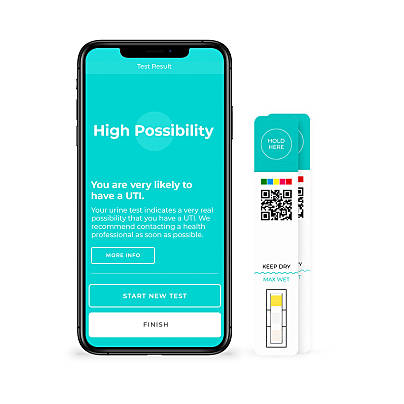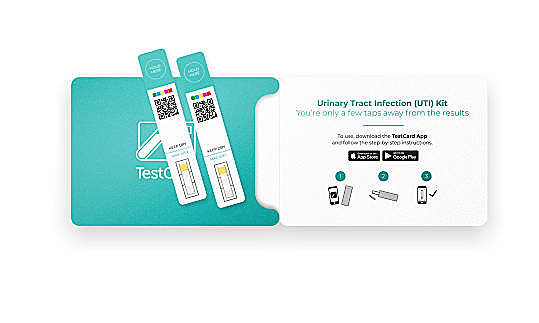38 options for getting rid of a UTI

Medically reviewed by
Dr Crystal WyllieLast reviewed: 29 May 2024
Getting rid of a urinary tract infection (UTI), such as cystitis can be as simple as waiting a few days, but if it’s more serious then you might need antibiotics. If you want to treat your symptoms at home, make sure you drink enough and pee as often as you need to. There’s also a long list of natural supplements, fruits, juices, and sources of vitamin C you could try as well, but keep in mind none of these are proven to work.
Options for getting rid of a UTI
If you’ve got a UTI or you’re worried about getting one and want to know your treatment options, there are 3 main categories to consider:
- Prescription antibiotics
- Home remedies
- Supplements
Prescription antibiotics like nitrofurantoin can be effective for UTIs like cystitis, but they aren’t always necessary. Sometimes doctors will suggest waiting up to 2 full days after your UTI symptoms start before you take antibiotics. This is because unless your symptoms are serious or they last a long time, antibiotics aren’t needed.
Home remedies are things you can try at home to help you recover from UTIs, such as self-care advice that doctors recommend or other options you could try. Although most haven’t been proven to work, some people say they help with symptoms. Generally, home remedies are a good place to start if you have a mild bladder infection that you’ve had for less than 2 days.
Supplements are another choice which you could try, but since they aren’t always proven to work, they might not be cost-effective. For details on supplements you could try to treat your UTI, see our ‘do natural supplements help with UTIs’ section.

No results found.
Please check your spelling or try another treatment name.
Which options are fastest?
If you’ve got symptoms of a UTI, it’s likely to take 2 to 3 days for you to recover, no matter what treatment option you go for. There’s no way to speed up recovery other than sticking to your treatment plan.
If your UTI is mild, it will usually go away by itself after a few days. You can help make sure your UTI doesn’t last longer by following doctor's advice on treating your UTI at home and not doing anything to make it worse.
If you do need to take a course of antibiotics, your doctor will usually prescribe:
- 3 day’s worth if you have a vagina
- 7 day’s worth if you have a penis
Your symptoms should clear up after this short course of treatment, but if it doesn’t then you may need to try a different antibiotic and your UTI may last longer. Antibiotics can make symptoms go away faster than not taking them, but only if your UTI needs to be treated.
10 home remedies for bladder infections
Things you could try at home to cure a bladder infection include:
- Water
- Peeing regularly
- Cranberry juice
- Other sources of vitamin C
- Other fruits
- Probiotic yoghurts
- Ginger
- Garlic
- Celery
- Peppermint
Water may seem like an obvious recommendation that is thrown around a lot when it comes to self-care, but there’s a good reason. Dehydration can make it harder for your body to fight off infections like UTIs. Although reviews of the effect of drinking more fluids to treat UTIs in the general population don’t show a clear link, a study into UTIs in care homes showed drinking extra water led to 58% less need for antibiotics and 36% less hospital admissions.
Peeing regularly is important to help flush the bacteria out of your system. Make sure you don’t try to hold your pee in if you can avoid it. When you do go to the toilet, make sure you completely empty your bladder each time.
Cranberry juice is a well-known home remedy for UTIs, but there is sometimes a bit of confusion as to how it works. Studies show that if you get UTIs often (such as recurrent cystitis), drinking cranberry juice regularly could reduce your chance of getting them by 3.7% to 72%. But this doesn’t show drinking cranberry juice will help you if you already have a UTI and there’s no evidence cranberry juice can help you recover from a UTI faster.
Vitamin C-rich foods and drinks, which happen to include cranberry juice, are also believed to improve UTIs. But, like with cranberry juice, the evidence is only really that it can prevent UTIs, not cure them. Even then, the evidence that vitamin C prevents UTIs is still unclear but a small study on pregnant women showed a 12.3% reduction in risk.
Other fruits have been looked at for helping with UTIs. Studies looking at different kinds of fruits for UTIs generally show mixed evidence. They also usually involve testing fruit extracts on bacteria directly and not on patients with UTIs. Including a lot of fresh fruit in your diet can be helpful but there’s no guarantee it will cure or prevent UTIs.
Probiotic yoghurts are thought to help UTIs by rebalancing the bacteria in and around your bladder and genitals. Again, these are only meant to prevent UTIs and not cure them. The research on probiotics for preventing UTIs is limited and studies show probiotics don’t really have a significant effect on UTIs.
4 other home remedies have been looked into for UTI treatment. These remedies have only been tested on bacteria directly and aren’t proven to help people with UTIs themselves. They include:
- Ginger
- Garlic
- Celery
- Peppermint
What not to try
Baking powder is a serious issue when treating UTIs at home. Not only will it not help, but there are studies on the risks of misusing baking soda. One study found around 5% of people were trying to treat UTIs using baking soda with 55% having serious symptoms and 6% being hospitalised.
Can you get rid of UTIs without antibiotics?
Antibiotics aren’t always necessary and your body does have ways of fighting off UTIs without prescription medications.
How your body fights a UTI
Your body has a number of defences which it can use to fight off UTIs itself, including:
- A mucus layer
- Peptides
- Immunoglobulins
- Immune cell defences, including cytokines and chemokines
These defences help weaken harmful bacteria and avoid or fight infections. Normally, with a bit of time, these defences are enough to help you recover from a UTI.
When to consider antibiotics
If your body’s natural defences aren’t enough to fight off a UTI, then you may get more severe symptoms or your infection won’t go away after a few days. That’s when it’s a good idea to talk to a doctor or order cystitis treatment online.
Symptoms of a UTI include:
- a painful or burning sensation when you pee
- needing to pee more at night
- pee that looks cloudy, dark, or smells strongly
- feeling the need to pee more suddenly, urgently, or often than normal
Serious symptoms that mean you need medical attention right away, include:
- blood in your pee
- having lower stomach pain or back pain just under the ribs
- having a high temperature or feeling hot or shivering
- having a low temperature of below 36°C
- feeling confused or drowsy
Always see a doctor if:
- it’s your first time having UTI symptoms
- you have a penis
- you're pregnant
- you get UTI symptoms right after having surgery
- your symptoms keep getting worse or they don’t get better after 2 days
- your symptoms come back even after treatment
A course of prescription antibiotics can provide your body with some help fighting off infections by weakening the infectious bacteria more.
28 other natural, over-the-counter supplements you could try
Supplements that are believed to help with UTIs include:
- Cranberry extract
- Probiotic supplements
- D-mannose
- Zinc
- Essential oils
- 23 other herbal extracts
Much like cranberry juice, cranberry extract only works to prevent UTIs and won’t help you recover faster from an existing UTI. Studies also show the chance of getting a UTI is slightly different for cranberry juice (20% to 30%) than for cranberry extract (18% to 39%).
Probiotic supplements, like probiotics yoghurts, don't seem to make much of a difference.
D-mannose is another supplement meant to help you avoid UTIs. A review of studies into d- mannose for UTIs shows that it does have an impact on preventing UTIs.
Essential oils have been looked at for treating UTIs and one study suggests that tea tree and thyme oils in particular might help with a UTI. But, since these oils are meant to be applied directly to areas affected by UTIs, we can’t recommend them as a treatment. There’s not enough evidence they really work and that they are safe for patients with UTIs to use topically. Applying essential oils directly to the skin could cause irritation, rashes, and burns.
Other herbal extracts have been looked at for treating UTIs. There is generally not enough research to prove whether these herbal options really work or not. We don’t recommend trying herbal treatments for UTIs since there isn’t enough research to show they are effective. If you do decide to try herbal supplements, always make sure you’re buying them from a shop that is properly regulated.

“If you wish to try herbal remedies for treating or preventing UTIs, it’s best to discuss this with your doctor first. They can make sure any herbal remedies you want to try won’t interfere with your current medications, as some can increase the risk of side effects while taking prescription medication. They can also give you advice on managing UTI symptoms.” – Dr Crystal Wyllie, Doctor at ZAVA.
Here’s a list of 23 other herbal supplements believed to help with UTIs:
- Uva ursi
- Dandelion
- Corn silk
- Horsetail
- Marshmallow root
- Lemongrass
- Myrrh
- Eucalyptus
- Goldenseal
- Echinacea
- Clove
- Cinnamon
- Oregano
- Gokhru
- Ajwain
- Spade flower
- Phyllanthus amarus
- Sohanjna
- Black myrobalan
- Holy basil
- Punarnava
- Greater burdock
- Juniper
What are my choices if I’m pregnant?
Generally, antibiotics are safe to take for UTIs if you’re pregnant. Pregnancy makes it easy for bacteria to cause UTIs, so you’re more likely to get them. UTIs can cause some complications like high blood pressure, stunted growth for your baby, or premature birth.
Because of the potential risk to you and your baby, it’s important you see a doctor and get treatment as soon as you get symptoms of a UTI. This may mean taking antibiotics to make sure you recover. It’s really important you don’t avoid getting help or using antibiotics.
Alternatives to antibiotics are not recommended during pregnancy, since they aren’t proven to work and may not be safe either. Always check with a doctor before using alternative treatments or supplements while pregnant in case there’s an extra risk to you or your baby.
Are there different options for men and women?
There are a few differences in the way UTIs affect you depending on whether you have a penis or a vagina:
- If you have a UTI and a penis, this is considered a ‘complicated UTI’ because of the way that your urinary tract system is set up. Generally, this means a longer course of antibiotics might be needed (7 days instead of 3). However, the treatments used are still the same.
- If you have a UTI and a vagina, then you’ll usually be prescribed a shorter course of antibiotics (3 days).
No matter who you are, drinking plenty of water and not holding it in when you need to pee is good advice for recovering from a UTI.
Frequently asked questions
What over-the-counter options are there?
If you’re finding your UTI particularly painful or uncomfortable, you can take over-the-counter painkillers to help you manage your symptoms, including:
- paracetamol
- ibuprofen
You can also buy cystitis relief oral solutions, but these haven’t been proven to help with symptoms or treat cystitis once you have the infection. If you’re worried about your UTI, see a doctor who may prescribe antibiotics.
Can I get rid of it in a few hours?
No, there’s no way to make a UTI go away this quickly. Even with antibiotics, UTIs take a few days to clear up and any alternative treatment that claims to work faster is making false claims.
Can I temporarily improve the symptoms?
Apart from over-the-counter painkillers, there are a few things you could try to ease your symptoms, including:
- drink lots of water
- avoid things that might irritate your bladder, like coffee
- use a heating pad on your stomach to help soothe your bladder
How can you naturally prevent UTIs?
There’s a few things you could try to make UTIs less likely, including:
- drinking plenty of water to flush out any bacteria that may be building up in your urinary tract
- drinking cranberry juice or taking cranberry extract
- taking d-mannose supplements
If you’re getting recurrent UTIs, speak to a doctor as you may need to take antibiotics for a longer period of time to stop it from coming back.

Crystal qualified in Medicine at Barts and the London School of Medicine and Dentistry in 2010. She then trained as a GP in London hospitals and practices. She has a particular interest in reproductive, sexual and women’s health.
Meet our doctorsLast reviewed: 29 May 2024
-
An overview on urinary tract infections and effective natural remedies, Journal of Medicinal Plants Studies [Accessed 28 May 2024]
-
Cystitis, NHS [Accessed 28 May 2024]
-
Effects of Cold and Hot Water Extracts of Onion and Ginger on Multidrug Resistant Bacteria Isolated From Urinary Tract Infection, Diyala Journal of Medicine [Accessed 28 May 2024]
-
Garlic as Alternative Therapy to Treat Uropathogene Bacteria in Women with Urinary Tract Infection in Lomé, Togo, Preprints [Accessed 28 May 2024]
-
Therapeutic potential of medicinal plants for the management of urinary tract infection: systematic review, Wiley Online Library [Accessed 28 May 2024]
Cystitis bladder infections are caused by bacteria and need to be treated with antibiotics. ZAVA offers a variety of treatment through a convenient, discreet service.











